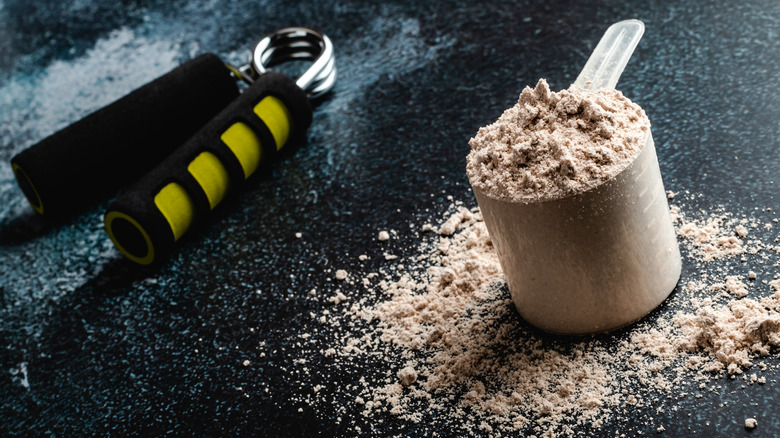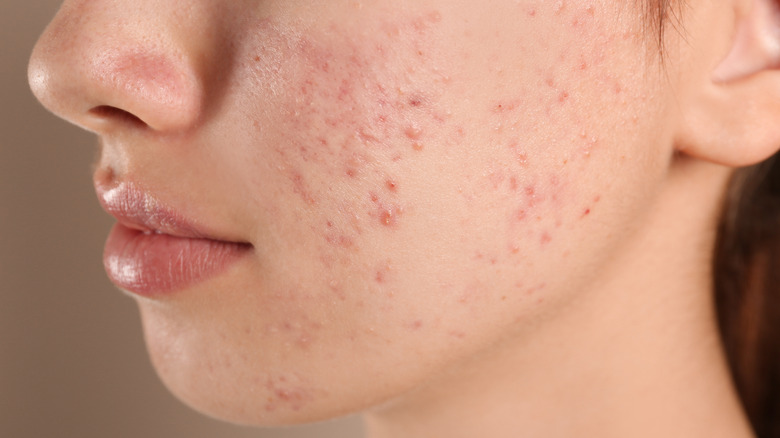Side Effects Of Whey Protein You Never Expected
Bloating, nausea, and indigestion are all common side effects of whey protein, according to WebMD. But even so, health experts recommend this supplement for its ability to build muscle and speed up post-workout recovery, according to the National Academy of Sports Medicine (NASM). Whey protein also increases fat loss and allows you to preserve lean mass while on a diet. On top of that, it suppresses appetite and keeps you full longer than carbs or fats.
The problem is that whey protein may contain added sugar and fillers, warns Harvard Medical School. As the researchers note, some brands deliver up to 23 grams of sugar per scoop. These products can also be contaminated with heavy metals, pesticides, and industrial chemicals, such as bisphenol A (BPA). The FDA isn't authorized to test dietary supplements before they hit the market, so it's hard to determine their safety. Many brands also use proprietary blends, meaning that they may not list the amount of each ingredient in their formulas.
Whey protein can be a good choice for active individuals, but you need to choose a trusted brand. Consider your nutritional needs and overall health, too. For example, if you're lactose intolerant, it makes sense to opt for whey protein isolate rather than whey concentrate, as the former has less than 1 gram of lactose per serving (via Healthline). Whey concentrate, on the other hand, boasts up to 3.5 grams of lactose per serving. And when deciding whether or not to incorporate whey protein to your routine, you may also want to consider some of its lesser-known side effects.
Whey protein may cause or worsen acne
As it turns out, there's a positive association between whey protein and acne. MDedge published five case reports of acne breakouts in teen athletes who used this product. For example, a 17-year old boy developed cystic acne on both cheeks shortly after he started to take whey protein supplements daily. Other teenagers developed inflammatory papules and pustules following whey protein consumption. This dietary supplement may also cause body acne, suggests a 2017 case report featured in Health Promotion Perspectives.
The relationship between whey protein and acne is unclear. Some researchers believe that it has something to do with cow's milk, the main source of whey (via the American Academy of Dermatology Association). In several studies, men and women who consumed milk regularly were more likely to have acne than those who didn't drink cow's milk. "Milk hormones increase the sebum production of the follicles, and whey protein increases insulin levels in the skin, which also increases sebum production," dermatologist Purvisha Patel told Well+Good. Excess sebum can clog your pores, leading to acne breakouts.
"Some people are extremely sensitive to the effects of whey protein and may not be able to tolerate any," says dermatologist Cybele Fishman to Well+Good. If you're sensitive to whey protein, consider switching to plant-based protein powder, such as hemp, pea, soy, or brown rice protein (via Verywell Fit). Soy protein powder, for instance, produces similar improvements in lean mass and strength as whey protein (per the International Journal of Sport Nutrition and Exercise Metabolism).
You may experience fluid retention and weight gain
Along with fats and carbohydrates, protein is one of your body's primary sources of fuel (via Human Kinetics). Each gram of protein or carbs supplies 4 calories, according to the U.S. Department of Agriculture. Dietary fat provides 9 calories per gram. Any of these nutrients can lead to weight gain when consumed in excess, notes dietitian Maxine Smith (via the Cleveland Clinic). The NASM recommends 0.7 to 1 gram of protein per pound of body weight per day. Some athletes consume up to 3 grams per pound of body weight, but they engage in strenuous workouts (per Bodybuilding.com). Most people don't have the same energy requirements as a pro athlete.
Besides weight gain, one of the most unexpected side effects of whey protein is fluid retention. Some brands contain large amounts of sodium and added sugars (per Consumer Reports), both of which can cause your body to hold water (via Men's Health). After ingestion, carbs (including simple sugars) are used for energy. The excess is stored as glycogen in the liver and muscles. Each gram of glycogen holds 3 grams of water, explains strength and conditioning specialist Nick Clayton. Creatine, a common ingredient in whey protein powder, promotes fluid retention too (per the Journal of Athletic Training). All in all, whey protein is likely safe when consumed in moderation. Check the label, research the ingredients used, and watch out for hidden sugars.



